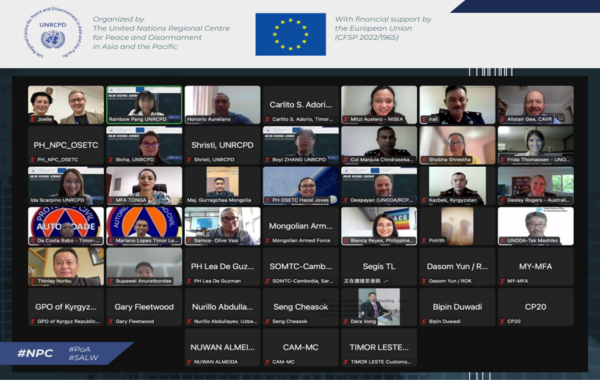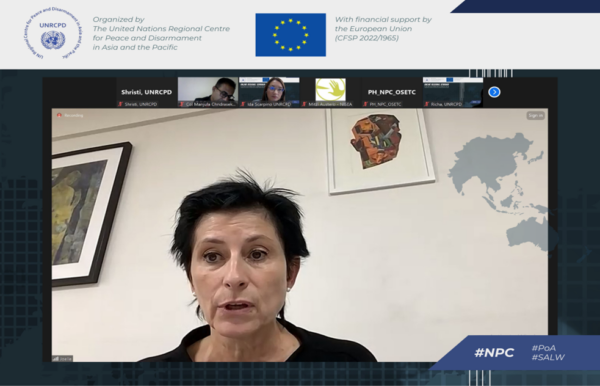Online Regional Seminar on the role of the National Point of Contact for the UN Programme of Action on Small Arms and Light Weapons
KATHMANDU, 4 October. The United Nations Regional Centre for Peace and Disarmament in Asia and the Pacific (UNRCPD) convened its online regional seminar targeting the National Point of Contact (NPC) on the UN Programme of Action (UN PoA) on Small Arms and Light Weapons (SALW) from the Asia Pacific Region.
The online regional seminar is the first of a series of meetings that UNRCPD is convening in preparation for the Fourth Review Conference (RevCon4), scheduled to take place in June 2024 in New York.
These efforts are part of a global project that seeks to support full and effective implementation of the UN PoA and its International Tracing Instrument, managed globally by the UN Office for Disarmament Affairs (UNODA) and implemented regionally by UNRCPD, with funds from the European Union.
The online regional seminar provided government officials and other stakeholders with an opportunity to discuss roles and responsibilities of the NPC, sharing best practices, lessons learned, and opportunities for enhancing inter-agency coordination and regional cooperation.
In total around fifty participants attended among government officials, civil society representatives and experts from UNRCPD and the UN Office for Disarmament Affairs. The following countries were represented: Australia, Bhutan, Cambodia, Fiji, Kazakhstan, Kyrgyz Republic, Malaysia, Maldives, Mongolia, Lao, Nepal, Papua New Guinea, Philippines, Republic of Korea, Samoa, Solomon Islands, Sri Lanka, Thailand, Timor-Leste, Tonga and Uzbekistan.
The following experts and practitioners from the civil society joined the event and led the specific segments: Ms. Mitzi Austero, Programmes Manager from Non-violence International Southeast Asia (NISEA), Ms. Shobha Shrestha, Executive Chair, Women for Peace and Democracy Nepal (WPDN), Ms. Amelie Namuroy, Programme Officer, International Action Network on Small Arms (IANSA), Mr. Alistair Gee, Executive Director, Centre for Armed Violence Reduction (CAVR), Ms. Reyes Bianca Dominique, Technical Assistant, Centre for Peace Education.

[Pictrure 1] Group photo of participants at the Online Regional Seminar on the role of the National Point of Contact for the UN PoA on SALW, 4th October 2023
The introductory session commenced with opening remarks from Ms. Joëlle Hivonnet, Deputy Head of the Delegation of the European Union to Nepal. Ms. Hivonnet highlighted that the diversion, illicit trade and unauthorized use of SALW remains a serious obstacle to peace, growth, development, and security in the region and the world. She reiterated the EU’s continuous support to the UN PoA as the most effective international framework to tackle SALW issues.
Next, Ms. Frida Johanne Thomassen, Political Affairs Officer at the UN Office for Disarmament Affairs, underscored the role of the National Point of Contacts in translating the PoA global policy efforts into actionable, tangible measures at national levels.
Mr. Deepayan Basu Ray, Director of UN Regional Centre for Peace and Disarmament in Asia and the Pacific, affirmed that NPC are crucial to guide a holistic approach to the multifaceted issues of SALW. One that integrates disarmament efforts with broader sustainable development goals, prioritizes gender equality and women’s participation. One that acknowledges the importance of working together with a wide range of stakeholders, including civil society and private sector.

[Picture 2] Ms. Joëlle Hivonnet, Deputy Head of Delegation, Delegation of the European Union to Nepal, delivering opening remarks
The opening session was followed by a thematic presentation on ‘transparency, reporting mechanisms and international cooperation and assistance’, delivered by Mr. Takashi Mashiko, Political Affairs Officer at UNODA. Mr. Mashiko, while providing guidance to participants regarding the PoA process, the PoA/ITI Reporting Database and available funding and cooperation mechanisms, highlighted the linkages between the PoA and complementary agendas. He underscored how compliance with the PoA provisions can significantly contribute to the achievement of Sustainable Development Goals, with a particular focus on SDG 16 and 5.

[Picture 3] Mr. Takashi Mashiko, Political Affairs Officer, UNODA, presenting the PoA related mechanisms and tools to promote the development of national and regional targets.
Ms. Ida Scarpino, Political Affairs Officer, concluded the substantive session with a presentation on the commitments that member states agreed upon on recent meetings on the UN PoA to enhance the capacity of the NPC at the national, regional and global levels.
As part of the concluding exercise and to support the thematic presentations, participants were divided into breakout groups to discuss experiences, challenges and actions for strengthening the capacities of NPC in Asia-Pacific and challenges in compiling and submitting national reports. The group discussion were moderated by the representatives of the civil society organizations who also shared their insight on how CSOs can support NPCs and the PoA process.
The regional seminar laid the groundwork for continued support in establishing an NPC Community in the Asia-Pacific region and a digital dossier that will include relevant materials, links and power point presentations to facilitate communication amongst Asia-Pacific Member States. The digital database will serve as an interaction hub for future work in this area.
For further information, please contact UNRCPD at unrcpd-info@un.org.

